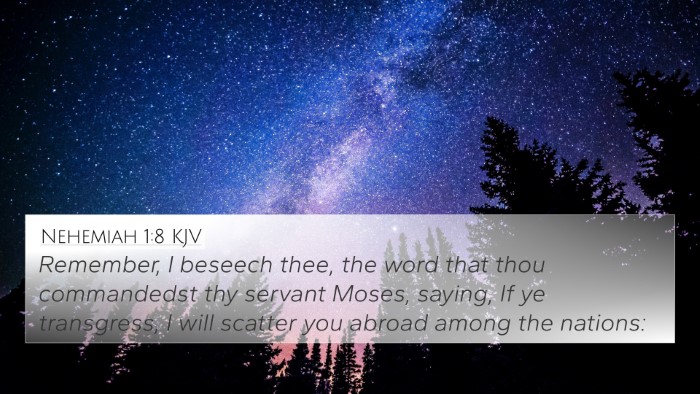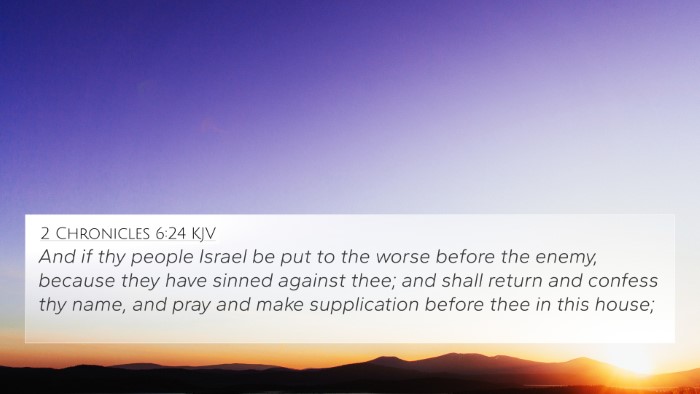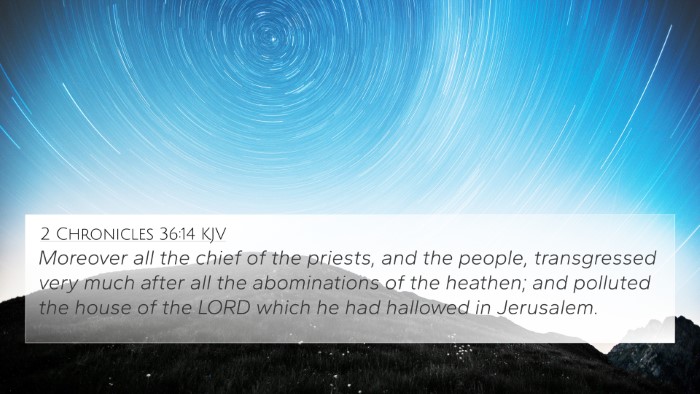Understanding 1 Kings 8:33
1 Kings 8:33 states: "When your people Israel are defeated before the enemy because they have sinned against you, and they turn again to you and acknowledge your name, and pray and plead with you in this house."
Summary of Meaning
This verse portrays the concept of repentance and God's readiness to hear the prayers of His people when they seek Him after suffering defeat. It underscores the importance of turning back to God in times of distress and acknowledges the correlation between sin and suffering.
Insights from Public Domain Commentaries
Matthew Henry’s Commentary
Henry emphasizes that this verse reflects a key principle in God's covenant with Israel; defeat is often a consequence of sin. He notes that true repentance involves both acknowledgment of wrongdoing and a turning back to God. Henry articulates how this posture elicits God's compassion and readiness to restore His people to favor.
Albert Barnes’ Commentary
Barnes highlights the theological implications of this verse, suggesting that it serves as a model for prayer and repentance among God’s people. He suggests that even in punishment, there is hope and a pathway back to God's grace through confession and earnest prayer. Barnes also points out the communal aspect of seeking God, illustrated by the collective prayer within the temple.
Adam Clarke’s Commentary
Clarke provides an extensive exegesis, noting the historical context of Israel’s struggles. He argues that this verse reveals not only God’s faithfulness but also serves as a reminder that the people must maintain their relationship with Him to avoid destruction. Clarke emphasizes the necessity of prayer and repentance when facing adversities, aligning with the themes present in the broader narrative of Israel's cycles of faithfulness and rebellion.
Bible Cross-References
- 2 Chronicles 7:14: "If my people, who are called by my name, humble themselves and pray and seek my face and turn from their wicked ways, then I will hear from heaven and will forgive their sin and heal their land."
- Jeremiah 29:12-14: "Then you will call upon me and come and pray to me, and I will hear you. You will seek me and find me when you seek me with all your heart."
- Deuteronomy 30:1-3: "And when all these things come upon you, the blessing and the curse which I have set before you, and you call them to mind among all the nations where the Lord your God has driven you, and return to the Lord your God and obey his voice..."
- Psalms 51:17: "The sacrifices of God are a broken spirit; a broken and contrite heart, O God, you will not despise."
- Isaiah 55:7: "Let the wicked forsake his way, and the unrighteous man his thoughts; let him return to the Lord, that he may have compassion on him, and to our God, for he will abundantly pardon."
- Micah 7:18-19: "Who is a God like you, pardoning iniquity and passing over transgression for the remnant of his inheritance? He does not retain his anger forever, because he delights in steadfast love."
- James 4:8: "Draw near to God, and he will draw near to you. Cleanse your hands, you sinners, and purify your hearts, you double-minded."
Thematic Connections
This verse and its commentaries bring forth themes of repentance, restoration, and the communal aspect of seeking God. Each reference above provides a better understanding of the biblical narrative concerning God’s response to His people's pleas.
Using Cross-Referencing Tools
For those looking to delve deeper into the connections between Bible verses, utilizing resources such as Bible concordances and Bible cross-reference guides can enhance understanding of thematic linkages across scripture. Cross-referencing facilitates a comparative Bible verse analysis that enriches one’s study and sermon preparation.
Conclusion
1 Kings 8:33 serves as a powerful reminder of the necessity of returning to God after wrongdoing. The understanding gleaned from Matthew Henry, Albert Barnes, and Adam Clarke highlights the implications of repentance and God’s willingness to forgive, encouraging believers to engage in heartfelt prayer and collective acknowledgment of sin.





















